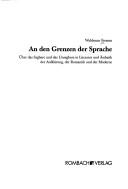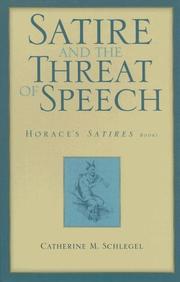| Listing 1 - 10 of 114 | << page >> |
Sort by
|
Book
ISBN: 9780292738805 Year: 2012 Publisher: Austin University of Texas Press
Abstract | Keywords | Export | Availability | Bookmark
 Loading...
Loading...Choose an application
- Reference Manager
- EndNote
- RefWorks (Direct export to RefWorks)
Speech in literature. --- Homer --- Criticism and interpretation.
Book
Abstract | Keywords | Export | Availability | Bookmark
 Loading...
Loading...Choose an application
- Reference Manager
- EndNote
- RefWorks (Direct export to RefWorks)
Speech in literature. --- Poetics. --- Rimbaud, Arthur, --- Technique.
Book
ISBN: 9791037016898 Year: 2021 Publisher: Paris : Hermann,
Abstract | Keywords | Export | Availability | Bookmark
 Loading...
Loading...Choose an application
- Reference Manager
- EndNote
- RefWorks (Direct export to RefWorks)
Que « tout parle » en l'ouvrage de La Fontaine ne doit pas tromper sur ses intentions élégamment tournées en vers joueurs. Les fables (« choses de paroles », selon leur étymologie) sont des histoires de gueules ouvertes et de dents acérées, l'animal fût-il doté du propre de l'homme : le langage. Car la faculté de parler y rencontre le plaisir de manger, dont elle est le prolongement au bout de la langue. La raison du plus fort se donne les raisons de souiller l'innocence pure ; la parole arme la violence et la méchanceté qui séparent des autres. Langage et pouvoir font cause commune dans ces contes âpres, criblés de loups cruels, de seigneurs voraces ou de moucherons vengeurs qui ruinent tout espoir dans l'élan civilisateur du discours et dans le profit pacificateur de la rhétorique. Par l'articulation du pouvoir et de la parole, La Fontaine fouille l'étendue de nos désirs, parcourt par maintes voies éperdues le passage de la nature à la culture, l'État, le droit, marqués par l'exercice des forces. Il passe au tamis de son anthropologie négative l'homme dans son rapport hostile au monde qu'il parasite des bruits du conflit ; et il conclut à l'hypocrisie, au leurre des solutions politiques. Ce faisant, le fabuliste se demande pourquoi parler aux hommes qui n'entendent que leurs passions, et si même la fable ne serait pas, elle aussi, compromise avec le pouvoir. À quoi sert d'écrire ? À rien peut-être sinon à l'essentiel : se laisser prendre, sans abandonner la lucidité, au charme des fictions, à s'engager dans l'alternative de l'imagination.
Book
ISBN: 1003189318 1003189318 1000968995 Year: 2023 Publisher: New York, NY : Taylor & Francis (Unlimited),
Abstract | Keywords | Export | Availability | Bookmark
 Loading...
Loading...Choose an application
- Reference Manager
- EndNote
- RefWorks (Direct export to RefWorks)
"Speech and Silence in Contemporary Children's Literature brings a fresh perspective to a central literary question-Who speaks?-by examining a variety of represented silences. These include children who do not speak, do not yet speak effectively, or speak on behalf of others. A rich and unexamined literary archive explores the problematics of children who are literally silent or metaphorically so because they cannot communicate effectively with adults or peers. This project centers children's literature in the question of voice by considering disability, gender, race, and ecocriticism. Children's literature rests on a paradox at the root of its own genre: it is produced by an adult author writing to a constructed idea of what children should be. By reading a range of contemporary children's literature, this book scrutinizes how such texts narrate the child's journey from communicative alterity to a place of empowered adult speech. Sometimes the child's verbal enclosure enables privacy and resistance. At other times, silence is coerced or imposed or arises from bodily impairment. Children may act as intermediaries, speaking on behalf of species that cannot. Recently, we have seen children exercise their voices on the world stage and as authors. In all cases, the texts analyzed here reveal speech as a minefield to be traversed. Children who talk too much, too little, or with insufficient expertise pose problems to themselves and others. Implicitly and sometimes explicitly, they attempt to hold adults to account-inside and outside the text. Speech and Silence in Contemporary Children's Literature addresses this underconceptualized subject in what will be an important text for scholars of children's literature, childhood studies, English, disability studies, gender studies, race studies, ecopedagogy, and education"-- Provided by publisher.
Book
ISBN: 3631357028 Year: 2000 Volume: 120 Publisher: Frankfurt am Main [etc.] Peter Lang
Abstract | Keywords | Export | Availability | Bookmark
 Loading...
Loading...Choose an application
- Reference Manager
- EndNote
- RefWorks (Direct export to RefWorks)
Epic poetry, Latin --- Speech in literature --- History and criticism --- Virgil.

ISBN: 379309412X 9783793094128 Year: 2006 Publisher: Freiburg im Breisgau : Rombach,
Abstract | Keywords | Export | Availability | Bookmark
 Loading...
Loading...Choose an application
- Reference Manager
- EndNote
- RefWorks (Direct export to RefWorks)
German literature --- Speech in literature. --- History and criticism.
Book
Year: 1992 Publisher: Muzaffarnagar : Kusuma Prakāśan,
Abstract | Keywords | Export | Availability | Bookmark
 Loading...
Loading...Choose an application
- Reference Manager
- EndNote
- RefWorks (Direct export to RefWorks)
Imagery in 20th century Hindi poetry; a study.
Hindi poetry --- Figures of speech in literature. --- History and criticism

ISBN: 0299209504 9780299209506 9786612269837 1282269836 0299209539 9780299209537 9781282269835 6612269839 Year: 2005 Publisher: Madison University of Wisconsin Press
Abstract | Keywords | Export | Availability | Bookmark
 Loading...
Loading...Choose an application
- Reference Manager
- EndNote
- RefWorks (Direct export to RefWorks)
In his first book of 'Satires', written in the late, violent days of the Roman republic, Horace exposes satiric speech as a tool of power and domination. Using critical theories from classics, speech act theory, and others, Catherine Schlegel argues that Horace's acute poetic observation of hostile speech provides insights into the operations of verbal control that are relevant to his time and to ours. She demonstrates that though Horace is forced by his political circumstances to develop a new, unthreatening style of satire, his poems contain a challenge to our most profound habits of violence, hierarchy, and domination. Focusing on the relationships between speaker and audience and between old and new style, Schlegel examines the internal conflicts of a notoriously difficult text. This exciting contribution to the field of Horatian studies will be of interest to classicists as well as other scholars interested in the genre of satire.
Speech in literature. --- Verse satire, Latin --- History and criticism. --- Horace. --- Rome --- In literature. --- Speech in literature --- History and criticism
Book
ISBN: 9782921764322 9782921764339 2921764326 2921764334 Year: 2008 Publisher: Montréal: Université du Québec à Montréal,
Abstract | Keywords | Export | Availability | Bookmark
 Loading...
Loading...Choose an application
- Reference Manager
- EndNote
- RefWorks (Direct export to RefWorks)
Book
ISBN: 9780813936970 9780813936963 0813936969 9780813936987 0813936985 0813936977 Year: 2015 Publisher: Charlottesville
Abstract | Keywords | Export | Availability | Bookmark
 Loading...
Loading...Choose an application
- Reference Manager
- EndNote
- RefWorks (Direct export to RefWorks)
Through her comparative methodology and historicist and feminist readings, Rosenthal asks readers to rethink the ways that speech and action intersect.
American fiction --- 19th century --- History and criticism --- Speech in literature --- Fern, Fanny --- Melville, Herman --- Stowe, Harriet Elizabeth Beecher --- Hawthorne, Nathaniel --- Speech in literature. --- History and criticism.
| Listing 1 - 10 of 114 | << page >> |
Sort by
|

 Search
Search Feedback
Feedback About UniCat
About UniCat  Help
Help News
News